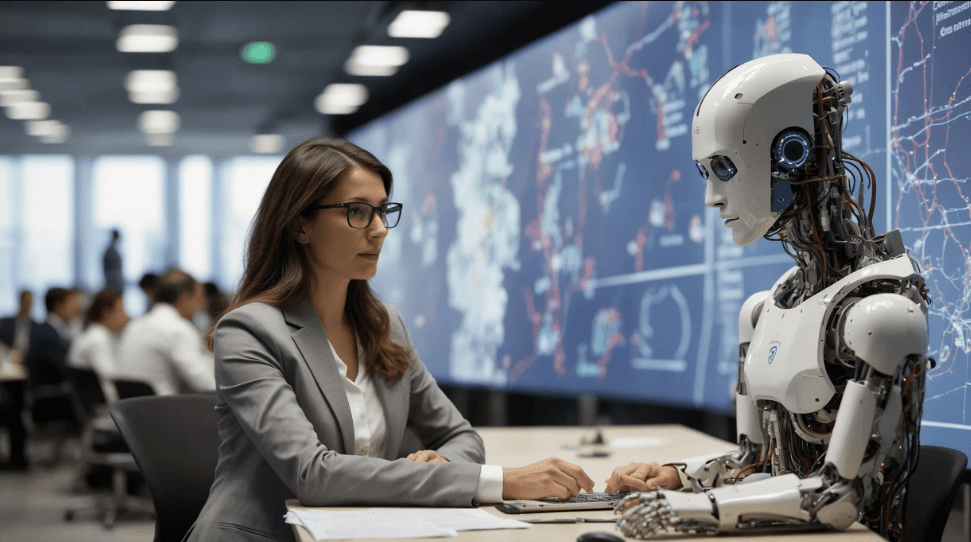AI Agents in the Workforce: Transforming Productivity in 2025
As we move toward 2025, artificial intelligence (AI) agents are revolutionizing the workplace, driving efficiencies, fostering innovation, and transforming productivity across industries. These AI-powered systems are no longer the stuff of science fiction; they are an essential part of business strategies, optimizing workflows, enhancing decision-making, and redefining roles within the workforce. The next few years promise even more profound changes as AI continues to evolve.
What Are AI Agents?
AI agents are intelligent systems designed to simulate human-like behaviors, making decisions, processing information, and performing tasks autonomously. These agents leverage machine learning, natural language processing (NLP), and data analytics to operate efficiently and solve complex problems with minimal human intervention.
In the workplace, AI agents can range from chatbots handling customer service inquiries to advanced virtual assistants capable of managing entire business processes. They are integrated into enterprise software, supply chain systems, and decision-support tools, offering businesses scalable and cost-effective solutions.
See also: http://Google I/O 2025: Unveiling Android XR and Gemini AI Innovations
The Rise of AI Agents in the Workforce
The transition to AI-driven workforce solutions isn’t just a passing trend—it’s an inevitable evolution. Here’s how AI agents are already reshaping the professional landscape:
Automating Repetitive Tasks
One of the most significant impacts AI agents are having on productivity is through the automation of routine, repetitive tasks. AI-driven systems can handle mundane administrative tasks, such as scheduling meetings, processing invoices, managing emails, and more. This allows human workers to focus on higher-level, strategic work that requires creativity, problem-solving, and critical thinking.
For example, in industries like finance, AI agents are being used to process transactions, track market trends, and even create personalized investment portfolios. In customer service, AI agents can manage first-line interactions, such as handling basic inquiries, troubleshooting common problems, and directing customers to human agents only when necessary.
Enhancing Decision-Making and Data Analysis
In 2025, businesses will increasingly rely on AI agents to make faster, more accurate decisions. With their ability to process vast amounts of data in real-time, AI agents can provide insights that are beyond the scope of human analysis. These insights allow organizations to predict market trends, adjust strategies on the fly, and optimize operational efficiency.
In sectors like healthcare, AI agents are already being used to analyze medical records, diagnose conditions, and recommend treatment plans. In manufacturing, AI agents can monitor equipment health, predict maintenance needs, and prevent costly downtime by identifying patterns in production data that humans might miss.
Improving Collaboration and Communication
AI agents are transforming how teams collaborate and communicate, particularly in remote and hybrid work environments. Virtual assistants like chatbots and task management systems are improving coordination between team members by handling routine queries, offering reminders for deadlines, and suggesting meeting times. This allows teams to stay focused on their core tasks and achieve greater productivity.
In 2025, more sophisticated AI-powered collaboration tools will emerge, enabling seamless communication between humans and machines. These tools will be able to interpret spoken language, summarize meetings, suggest solutions to problems, and even act as virtual team members.
Fostering Innovation in Product Development
AI agents are crucial to driving innovation in product development. By analyzing consumer behavior, predicting trends, and providing insights based on big data, AI systems enable businesses to develop products and services that meet evolving customer needs. For example, AI can identify gaps in the market, suggest features for new products, or recommend improvements to existing ones.
In industries such as software development and engineering, AI agents can streamline the testing process, find bugs, and recommend solutions. This accelerates the product development cycle, helping businesses stay ahead of the competition.
The Future of AI Agents: What to Expect in 2025
By 2025, AI agents are expected to become even more sophisticated and integral to the workforce. Here’s a glimpse into the future:
AI-Powered Personalization at Scale
Businesses will increasingly use AI agents to deliver personalized experiences to customers and employees alike. AI systems will analyze individual preferences and behaviors, providing tailored recommendations, content, and services. For example, AI agents could curate a personalized work environment, adjusting workloads, communication styles, and even work hours to fit an employee’s unique needs and preferences.
In customer-facing industries, AI agents will take personalization to new heights, offering services that are hyper-targeted to individual customer profiles, thereby increasing customer satisfaction and loyalty.
The Emergence of AI-Driven Leadership
As AI continues to advance, it’s not just limited to supporting roles; AI agents will take on more leadership functions. AI-powered leadership tools can help managers make better decisions, identify team strengths and weaknesses, optimize workflows, and monitor productivity metrics in real-time.
AI leaders could analyze market conditions and make data-driven decisions faster than human counterparts. They may be responsible for advising executives on strategic initiatives and guiding business growth with a level of precision previously unattainable.
New Roles and Skills in the Workforce
The rise of AI agents will lead to the creation of entirely new roles within organizations. While some job categories will be automated, many others will evolve. AI specialists, data analysts, and AI ethicists will become increasingly valuable as businesses seek to understand, develop, and manage their AI systems.
Moreover, employees will need to cultivate new skills to work alongside AI agents. This includes understanding how to leverage AI tools, overseeing their outputs, and ensuring that AI-driven processes align with human values. Continuous learning and adaptation will become a core element of the workforce in 2025.
Increased Ethical Considerations
As AI agents become more pervasive, the ethical considerations surrounding their use will become more complex. Issues such as bias in AI algorithms, data privacy, job displacement, and AI accountability will dominate discussions in the workplace. By 2025, businesses will need to establish ethical frameworks for AI development and use, ensuring that AI agents act in ways that are transparent, accountable, and aligned with societal values.
Conclusion: A New Era of Workforce Productivity
By 2025, AI agents will be an indispensable part of the workforce, helping organizations streamline operations, increase productivity, and deliver enhanced customer experiences. These systems will not only automate tasks but also support decision-making, foster innovation, and improve collaboration across teams. As AI agents become more sophisticated, they will shape the future of work, creating new opportunities, challenges, and roles for human workers.
Embracing this new wave of AI technology will be critical for businesses looking to stay competitive in a fast-evolving landscape. The future is bright, but it will require careful planning, investment in new skills, and a commitment to ethical AI use.






